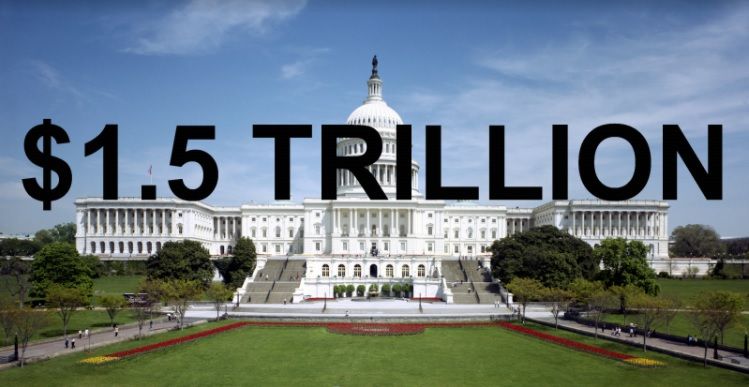By: Angelina Miller & Hope Daluisio
Defining the G.O.P Tax Plan
On Saturday, Dec. 2, the United States Senate passed a $1.5 trillion tax plan after a 51-49 vote. This nearly 500-page bill not only ranks as one of the biggest tax changes ever, but among the biggest tax cut in American history.
The House passed its version of the tax bill on Thursday, Nov. 16. Now the House and Senate have to reconcile their different versions and agree on a final version. They hope to do that before the end of the year.
The decisions that President Trump and current Republican leaders in Congress are making will affect the present and future lives and financial state of every American citizen, young and old.
On one hand, the thought of that is fueling high-earning Americans with a buzz of excitement. On the other hand, students, teachers, families and most of those in the middle class are all left feeling anxious and worried.
In the eyes of President Trump, the passing of this bill will take our country one step closer to delivering massive tax cuts for working families across America. All but one Republican in the U.S. Senate are on Trump’s side, only advertising the positive ideas of job growth and economic expansion within this bill.
While they are intending to market their intentions with this bill as a middle class tax cut that will benefit everyone, others do not think it is that simple.
All Democrats such as Senator Chuck Schumer are aware of that and view Trump’s actions as a way to “stuff even more money into the pockets of the wealthy and the biggest corporations.” Along with Schumer, millions in America’s middle class are fixated on how this will negatively affect their taxation and spending on health care, education, transportation and social services over the next 10 years. Many have pointed out that many will see a tax cut when the bill in enacted, but over the next 10 years, many will see their tax cuts evaporate and end up paying more.
How it affects college students

Between balancing classes, extracurricular activities, jobs and internships, college students barely have time to make sure they eat and get enough sleep at night. With that being said, a majority of young adults do not choose to spend their free time reading up on what is happening in the world around us.
Gabrielle Case (left in photo), a 20-year-old junior student at Cabrini University, is one of many college students that are unfortunately allowing the news about the tax plan go right over their heads.
“I’m honestly pretty unfamiliar with what’s going on, besides that they are trying to cut fundings for schools,” Case said.
Case is currently studying to become an elementary level special education teacher. Although she said she typically receives “every daily news story” through Twitter and other social media platforms, she still remains unaware of how her future will be affected by this bill.
In general, the House version of the bill affects college students more negatively than the Senate version. According to the National Center for Education Statistics, grants and loans are the major forms of federal financial aid for degree/certificate-seeking undergraduate students. however, the House GOP tax plan would eliminate the current $2,500 student loan tax deduction and begin taxing loan payments and scholarships that act as tuition waivers. The Senate version of the bill does not hurt students in these ways.
In simpler terms, this plan would potentially make it much harder for millions of American students, such as Case, to pay back their student loans. It would also make college more expensive and further out-of-reach for future middle- and lower- class Americans.
As if that is not enough, the House plan would also eliminates a current $250 tax deduction for teachers who spend an average of $500 their own money on classroom supplies. This would leave major corporations as the only ones who will still receive a federal tax deduction for items such as office supplies, sales tax and mortgage interest. The Senate version does not eliminate the deduction.
This has a direct impact on the future of a student like Case who are studying to go into the field of teaching, when teachers currently spend an average of $500 on office and classroom supplies.
“When someone like myself is beginning to pay off their loans after college, I won’t have much money to buy supplies for my classroom and a huge tax cut won’t help,” Case said. “I have seen so many children in the classroom be deprived of resources and there’s sometimes nothing the teachers are able to do about it and it’s very upsetting. Children need resources to learn.”
When the House and Senate get together to work out their differences, they will have to figure out where they can cut deductions because they want to give a huge tax cut to corporations, from 39 percent to 20 percent corporate tax rate. They also want to let very rich people, when they die, give millions to their children tax-free. These tax cuts are adding more than a $1 trillion to the deficit, so Congress has to figure out how to make these large cuts without increasing the deficit so much that more Republicans in Congress object.
Diminishing the future of graduate students

Graduate students such as Giavanna Garsey, a 23-year-old counselor for Cabrini University’s Undergraduate Admissions office, will also not only be deprived of having the resources to learn, but being able to continue their education and advancement in life altogether.
“My plan for 2018 was to finally move out of my parents house and live on my own. But with this bill being passed, instead of moving onto the next step of adulthood, I’ll just be stuck at square one.”
Garsey has only been out of college for a year and a half but is in a position where she loves her career in higher education and everything about the university she works for. A few benefits of her job include helping prospective students through their college selection process and receiving a tuition waiver to work towards her graduate degree.
Garsey and a multitude of other graduate students are earning their graduate degrees tuition free, in exchange for working at the college itself; however, under the House GOP tax plan, graduate students would no longer receive this tuition reduction tax-free. This would not only make it basically, financially extremely hard for lower- and middle-class individuals to earn a Ph.D. in the United States, but moreso strip graduate students like Garsey of major benefit of their current endeavors.
“Tuition remission is the best thing for me,” Garsey said. “If it wasn’t an option, I could not afford to go back to school.”
Each month Garsey pays around $1,000 towards her student loan debt for her undergraduate degree. She received a little bit of money when she attended Temple University, but pays for her tuition on her own. Garsey unfortunately described the money she currently owes to her loan provider as a “very scary number.”
“If this bill goes into effect, I will not be able to continue with my degree if I want to be able to have spending money,” Garsey said. “There is no way that I would be able to afford both undergraduate loans and a attain a graduate degree.”
Garsey is also aware that she will not be the only one affected by the tax bill. Many of her coworkers, friends and family members that work for an organization that provides tuition remissions would also suffer with her.
“It is very frustrating to be in this position,” she said. “I feel like the people who want this bill to be passed don’t want people like me to move forward in life. I am working hard for a better future, and they are taking it away from me.”
Going beyond universities

Students working towards their undergraduate, graduate or doctorate degrees are just a portion of the mass amount of Americans who will be affected by this bill. Universities actually have the advantage of being able to individually create new methods to continue to support their students.
Current doctoral students such as Tom Southard, the director of Cabrini University’s Wolfington Center, are aware that this will impact him, his peers and, most importantly, the common good.
Southard has been working passionately since 2013 to engage students through community based learning and Catholic Social Teaching on real world social justice issues. In addition, he is now currently working toward his doctorate through Cabrini’s programs.
“I think the tuition part of the bill will change the American landscape on how we do tuition, but it’s not the end of the world,” Southard said.
Aside from current undergraduate, graduate and doctoral students, this tax bill affects every economic class, family and individual living in the United States. Southard’s concern is fixated on how this tax bill will affect the poor and how it will eventually affect everyone 10 years from now.
“My wife and I are middle class, so we can afford an additional small amount of taxation,” Southard said. “The real problem is going to be that large number of poor people who cannot afford it.”
The tax cut is predicted to boost the economy within the next four to five years, but may end in a “level out.” This “level out” could potentially put the United States at a deficit within the global market and would not be as competitive as in the past.
In 2027, the percentage of lower-class citizens who would receive tax cuts with this bill will significantly decrease, while high-class citizens would only barely decrease.
“The poor are going to hurt the most, but I think everyone is going to be in a worse situation than they were before. This is except for former presidents, who are worth millions of dollars,” Southard said.
Another concern Southard has about this bill is how quickly it has been passed through legislative. Being a tax lawyer by training, Southard has never seen a bill be passed in this type of fashion.
“This is one of the most regressive pieces of tax legislation that I have ever seen in my lifetime studying taxation,” Southard said. “I’ve been in the congressional building in the capital for late night votes and I’ve never seen a hand written piece of legislation. It was rammed through in an unprecedented way.”
Everyone will be impacted
All in all, the tax bill will drastically affect the livelihood of all citizens in the United States. The biggest tax cut in American history has already created the biggest reaction and will continue to for the next ten years.
Southard said, “My biggest concern is that the holistic effect of this tax bill on the poor, on the economy, on the future of the United States and on our ability to be competitive in the world market.”



